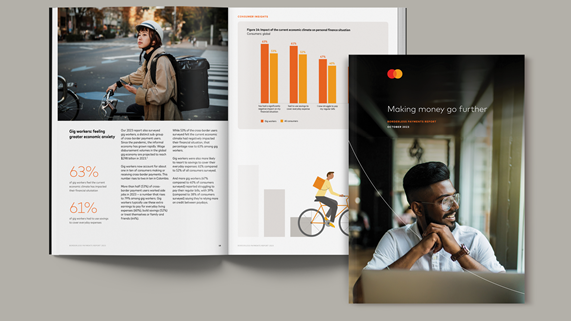Closing the distance with simple and safe remittances
November 6, 2023 | By Silvana Hernandez
I grew up in Mexico City, the political, financial and cultural center of Mexico. Known as the City of Palaces, it is home to hard-working, welcoming, joyful individuals for whom family is the most important element of life.

From a very early age, I heard about remittances. Every morning, as my father drove us to school and played the news on the radio, I would hear the latest figures on these money transfers and their impact on my country’s economy. More importantly, I knew families behind the figures — like my grandmother’s neighbor, whose three sons went abroad to work in restaurants and would send money to pay for their family’s housing, food and health care expenses.
When they came back home every three years or so, they were greeted as heroes. But after a couple of weeks, the joyful family reunion would be replaced by a goodbye, and a deep sense of loss would settle in again.
Remittances have only gained in importance since — for my country and many others — and are expected to reach $810 billion in 2023, a four-fold increase from 2003. They often defy expectations, continuing to grow during the pandemic even though many migrant workers lost their jobs, worked fewer hours or were affected by the virus.
Recent data from Mastercard’s “Borderless Payments Report 2023: Making money go further,” shows the trend is not abating: 41% of people surveyed expect to make international payments more often over the next 12 months. And nearly half also plan to increase the value of their transactions.
The United Nations reports that 200 million people each year send remittances to 800 million family members, but remittances are still not frictionless. Our Borderless Payments research shows that one-third of consumers have experienced failed or late payments. This was highest in India (47%), the U.S. (42%) and the UAE (40%).
The impact of these failed or late payments is significant, as 75% of remittances are spent by recipients on immediate needs such as food, housing and medical bills. Three-quarters of the people we surveyed said this had a negative impact on their ability to support themselves. And one-third of senders said it had meant they could not support family and friends abroad.
The other problem with remittances is that they are often sent and received in cash. This is costly — adding a 4% premium to the cheapest digital alternatives — and inconvenient: One in four respondents in our Borderless Payments Report told us their family must travel a long way to access their funds.
As with many things, technology can help alleviate these inefficiencies. And at Mastercard we are working on several fronts to make money go further, faster and more securely.
We recently joined forces with Remitly, a leading digital financial services provider for immigrants and their families. Tapping into the power of the Mastercard network, Remitly will integrate Mastercard’s Send and Cross-Border Services to offer consumers more choice in how they securely send money to family and loved ones abroad via the Remitly app. Our collaboration provides Remitly users with an added layer of convenience and peace of mind, ensuring that funds get into the right hands when they need it most.
We also work with Paysend, a London-based fintech, to enable unbanked users in northern Central America to receive remittances from the U.S. via instantly issued Mastercard digital cards. These cards are ready to use in minutes for cash withdrawals and online payments and play a key role in bringing unbanked users into the digital economy.
Since choice in delivery methods is key, we are also investing in remittances to mobile wallets, which can go a long way in making remittances faster and cheaper. Airtel, for example, is leveraging Mastercard’s global network and digital payments capabilities to deliver a first-class experience for more than 100 million Airtel Africa mobile phone users looking for access to fast and secure money transfers.
And we also work with smaller financial institutions, which have not typically been part of the traditionally complex cross-border payment ecosystem and need access to easy-to-implement solutions to provide their account holders with a digital payment experience. We are now able to provide these community banks and credit unions with the same international payments features as their bigger counterparts with a simple, turnkey solution.
There is much more to be done — on the public- and private-sector sides — to digitize remittances and make money go further. Our Borderless Payments Report is an opportunity to commend the determination and resilience of migrant workers who are sending hope to their loved ones and communities back home. And a reminder that we need to continue using technology to help them make their hard-earned money go further, faster.

